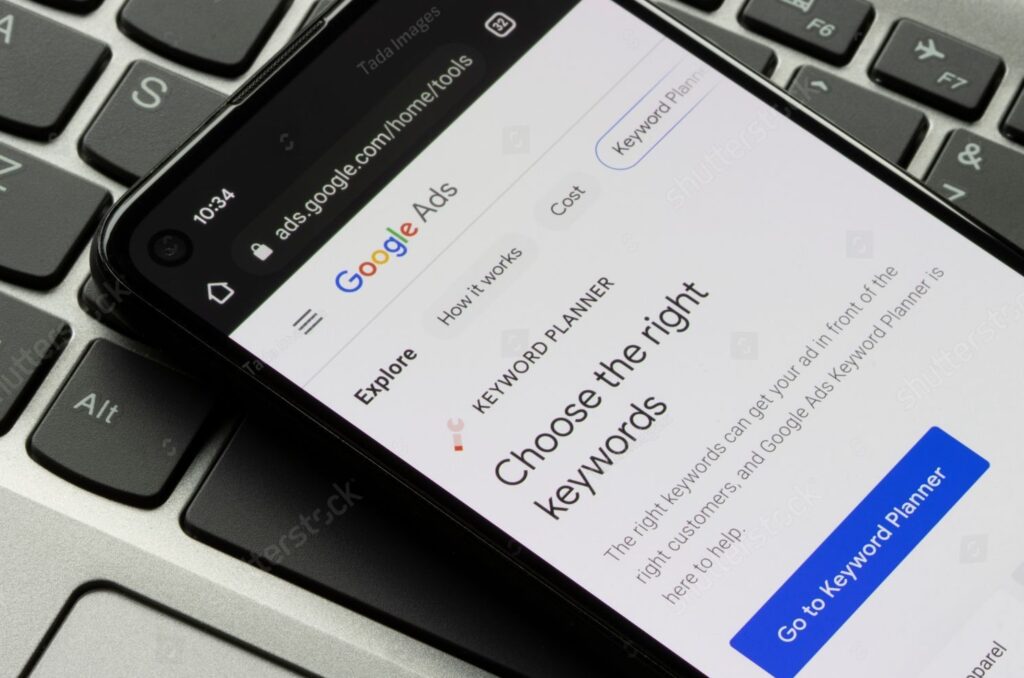PPC keywords are the search terms you choose to target in your pay-per-click campaigns. They are the words and phrases you’re willing to bid on so your ads appear when people search for them. They are the bridge between what your audience is looking for and the solution you’re offering.

According to HubSpot, getting this choice right directly impacts how relevant your ads are, how much you pay for each click, and how likely those clicks will turn into actual customers.
For example, someone types “order office chairs near me” into Google. If you’re a furniture retailer and that phrase is one of your PPC keywords, your ad can appear right at the top of the results.
The more closely your keywords match the searcher’s intent, the more likely they are to click and make a purchase. This article will show you the exact research steps and match types that make campaigns profitable. It also explains how to use keyword intent to turn clicks into customers.
If the idea of finding those high-performing, intent-rich keywords feels overwhelming, you’re not alone. Many businesses waste budget on broad terms that bring in clicks but not conversions. This is exactly where Socialander’s Pay-per-click Services come in. We handle structured keyword research, match-type strategies, and negative keyword setups that ensure every click you pay for is a step closer to a sale.
Why Keywords Matter in PPC
Keywords are the backbone of every successful PPC campaign. According to Search Engine Land, businesses make an average of $2 for every $1 spent on Google Ads, but this ROI heavily depends on keyword selection. Choose the right ones, and you’ll put your business in front of people ready to take action. Choose poorly, and you’ll pay for clicks that go nowhere.
In PPC, keywords directly influence how much you spend, how often your ads show, and how relevant your ads feel to your audience. This is where Quality Score comes in.
#1. Relevance and Quality Score
In PPC advertising, Google uses something called Quality Score to decide how much you’ll pay per click and where your ad appears. This score is influenced by three key factors:
- Expected click-through rate (CTR): How likely people are to click your ad when they see it
- Ad relevance: How closely your ad matches the search query
- Landing page experience: Whether your page delivers on what the ad promised
When your keywords are tightly aligned with your ads and landing pages, your Quality Score goes up. Higher scores often mean lower cost-per-click (CPC) and better ad positions. In other words, you get more visibility and increased sales while spending less. This is why keyword research should be prioritised when setting up PPC campaigns.
#2. CTR & Conversion
CTR and conversion rates are where keyword precision really shows its worth. When your keywords are focused on searcher intent, you’re more likely to attract qualified traffic that converts. This isn’t because of luck, but because your ad appears in front of people already in the buying stage.
WordStream’s latest data shows that targeted, specific keywords consistently outperform broad terms in both click-through rates and conversion rates. For instance, bidding on “buy ergonomic office chairs in Lagos” will almost always outperform something vague like “furniture,” both in CTR and actual sales.
Types of PPC Keywords
Not all PPC keywords work the same way. Some protect your brand, some bring in new audiences, and others drive action. Understanding the differences helps you build a keyword strategy that covers every stage of the buyer journey. Before going deeper, understand how to do a PPC campaign to avoid wasting ad budget. (Insert link to how to do a PPC campaign here)
#1.Branded vs Non-branded Keywords
Branded keywords: These include your business or product name, like “Socialander PPC services” or “Nike running shoes.” They usually have high intent because the searcher already knows you. Bidding on branded terms helps you protect your brand from competitors and secure top placement for people searching specifically for you.
Non-branded keywords: These target broader audiences who may not know your brand yet, such as “digital marketing agency in Lagos” or “best PPC agency.” These keywords are excellent for bringing in new customers, but they need to be selected carefully to avoid wasting clicks on people who aren’t ready to buy.
#2. Intent-based Groups
One of the most effective ways to organise PPC keywords is by searcher intent:
Transactional keywords: The searcher is ready to buy, e.g., “order iPhone 15 Pro Max online.” These deserve your highest bids and should lead to product or checkout pages.
Commercial investigation keywords: The searcher is comparing options, e.g., “best solar panel installers in Lagos.” Perfect for landing pages with strong value propositions, comparisons, or case studies.
Informational keywords: The searcher is looking for knowledge, e.g., “what is PPC advertising.” They may not convert immediately, but they’re useful for building remarketing audiences.
Knowing which bucket your keyword belongs to helps you match the right ad message and landing page, avoiding the mistake of sending someone in research mode straight to a checkout page.
#3. Match Types
Match types determine how closely a search term must match your chosen keyword before your ad appears. Choosing the right one isn’t just a technical setting; it’s how you control ad relevance, budget efficiency, and ultimately, ROI.
Exact match: Your ad appears only when the search term matches your keyword exactly or very closely. Best for high-intent, high-converting searches and targeting ready-to-buy users searching exactly for your offer.
Example: Keyword [exact match] “PPC management services” could trigger for “PPC management services” or “PPC management service,” but not for “cheap PPC tools.”
Phrase match: Your ad shows when the search includes your keyword phrase in the correct order, with other words before or after. Good for capturing a broader range of relevant queries.
Example: Keyword “digital marketing agency” could trigger for “best digital marketing agency in Lagos” or “hire digital marketing agency” but not for “agency for marketing digitally.”
Broad match: Your ad may appear for searches related to your keyword, including synonyms and variations. It’s the widest net, great for discovery, but needs close monitoring to avoid wasted spend.
Example: Keyword “PPC training” could trigger for “Google Ads course,” “pay-per-click tutorial,” or “online advertising lessons.”
#4. Negative keywords
These block your ads from showing for irrelevant searches. They’re essential for preventing budget waste on unqualified traffic.
Example: If you sell paid web design courses, you might add “free” as a negative keyword to avoid clicks from people who will never convert.
A smart PPC strategy blends these match types for balance: using broad for reach, phrase for flexible targeting, and exact for precision. At Socialander, we fine-tune this mix for each client, constantly checking search term reports so you’re not paying for clicks that never convert.
How to Do PPC Keyword Research
Before diving into tools and tactics, remember that good PPC keyword research isn’t about finding the most searched terms; it’s about finding the right terms for your goals.
#1. Defining Your Business Goals & Seed Keywords
Firstly, define why your campaign exists. Are you aiming for direct sales, lead generation, or awareness building? The answer determines which keywords deserve your budget.
Ask yourself:
- What action do we want users to take? (purchase, sign up, request a quote)
- Who are we targeting? (location, demographics, buying stage)
- What exact words would they type when they’re ready to act?
From here, write down seed keywords. Seed keywords are the obvious terms related to your offer. For instance, a PPC agency in Lagos might start with “Google Ads management Lagos,” “PPC services Nigeria,” or “hire a PPC specialist.”
These seeds are your raw material. They’ll be refined, expanded, and organised into the keywords that make you money.
#2. Expand Seed Keywords
Once you have seed keywords, expand them using keyword research tools. Here’s a mix of free and paid options that provide comprehensive keyword insights:
- Google Keyword Planner (Free): Search volumes, competition, CPC ranges
- WordStream Free Keyword Tool (Free): Quick related keyword suggestions
- SEMrush (Paid): Competitor keyword spying, keyword gap analysis
- Ahrefs (Paid): Organic + paid keyword overlaps, keyword difficulty
- Search Terms Report (Free via Google Ads): See actual queries triggering your ads
- Competitor Ad Analysis: Search your target terms on Google and note competitor messaging

A Screenshot of how to use Google Keyword Planner for PPC Keyword and ad group research
#3. Build Keyword Lists & Group by Intent
With your keyword ideas ready, sort them into intent groups: transactional, commercial investigation, and informational. This ensures your ad copy and landing pages match search intent perfectly.
Example:
- Ad Group 1: “buy PPC software” → Direct to pricing page
- Ad Group 2: “best PPC software for agencies” → Comparison guide page
The tighter your ad groups, the higher your Quality Score and CTR. That means less waste, more conversions.
#4.Negative Keyword Discovery
Just as important as finding the right keywords is excluding the wrong ones. Use your Search Terms Report to find phrases bringing irrelevant clicks.
Example table:
| Irrelevant Search Term | Why It’s Irrelevant | Negative Keyword Added |
| Free PPC training | Not offering free | free |
| PPC jobs in Lagos | Job seekers, not buyers | jobs |
Stop bidding on keywords that spend money without conversions, even if they bring traffic.
Common PPC Keywords Mistakes and How to Fix Them
Digital marketers and advertisers sometimes make avoidable keyword mistakes that eat into ROI. Here are the big ones to watch:
#1. Bidding on Extremely Broad Terms with No Negatives
This is the fastest way to burn through your budget. Always layer in negative keywords and test narrower match types before committing significant spend.
#2. Not Using Match Types or Ignoring Exact/Phrase Testing
Exact and phrase match keywords tend to bring higher intent traffic. Use them alongside broad match for coverage, but track each type’s performance separately.
#3. Leaving Out Intent Analysis
Running transactional ads on informational searches creates mismatched messaging and poor conversion rates. Always align keyword intent with the right ad and landing page.
At Socialander, we help businesses avoid these costly mistakes by implementing strategic keyword research and ongoing optimisation. Our PPC specialists ensure your campaigns target the right terms with the right intent, maximising your return on ad spend.
Frequently Asked Questions
Q1: Should I bid on my brand name?
Yes, it protects your brand from competitors and ensures you control the first impression in search results.
Q2: How many keywords should be in one ad group?
5–20 closely related keywords, all directed to the same type of landing page.
Q3: How often should I review my keyword list?At least weekly for active campaigns, and always within a few days after launching a new ad group.
Conclusion
Winning with PPC keywords is about attracting the right clicks from people ready to act. Start with clear goals, research strategically, group by intent, and continuously refine with negatives and performance data.
At Socialander, we’ve refined PPC keyword strategies across multiple industries, turning wasted spend into profitable campaigns. Our Pay-per-click Services handle the research, testing, and optimisation so your budget brings you results. Reach out today!





